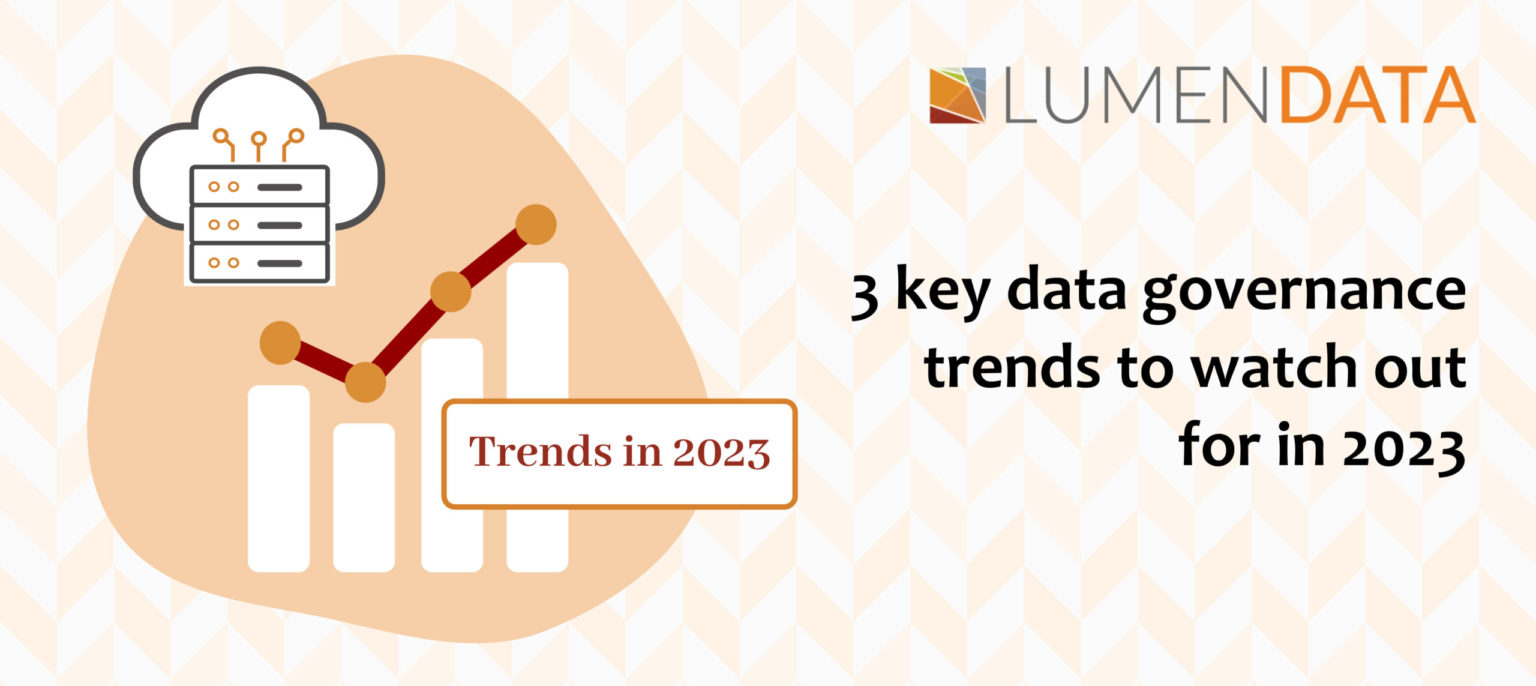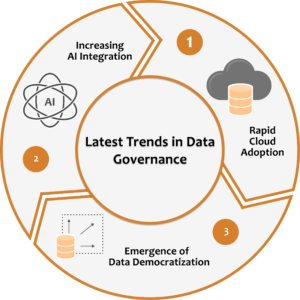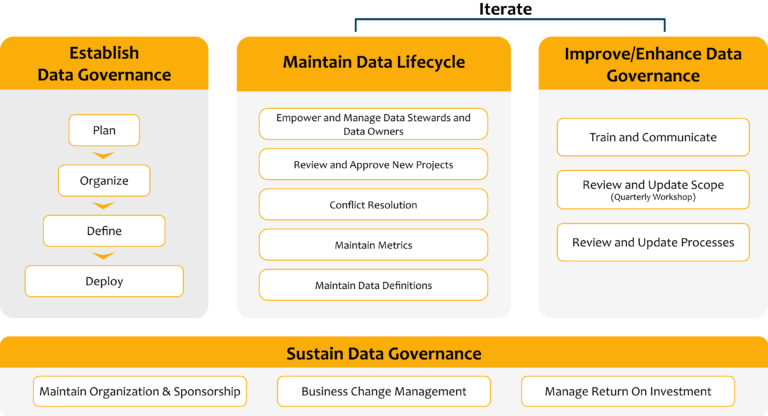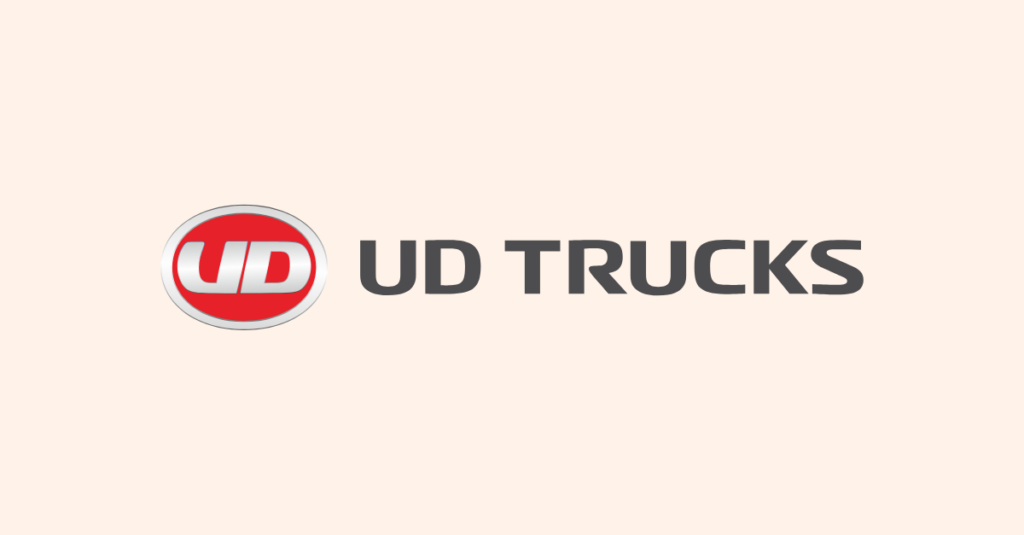Research says that unstructured data costs 12% of the company’s revenue. Businesses need to ensure that their data is consistent and trustworthy. Enter the potential of data governance! The ways data is governed are evolving consistently to address data-associated anxieties across different industries.
This blog will dig deep into some of the key trends shaping the future of data governance and empowering businesses to leverage their data more effectively.
Read on.
What is cloud data management
Data governance is setting up internal policies and guidelines to ensure and streamline data accuracy, reliability, accessibility, and security.
Research says that 87% of consumers would not engage with a company if they had concerns about its security practices. 71% would stop doing business with a company if it gave away sensitive information without permission. Here is where data governance comes in. Data security is one of the most crucial aspects of data governance.
Let’s take the example of a retail business. Imagine a data governance strategy that is designed to ensure the privacy of customer data. It will require that all customer-related data is handled securely as it flows through different business processes within the retail organization. Compliance will be ensured with relevant government standards like GDPR to keep customer data protected and updated throughout their purchase journey.
Do you know that the global data governance market will reach a value of USD 5.7 billion by 2025? Also, it will grow at a CAGR of 20.83% by 2027. Enterprises facing challenges in implementing data privacy at scale or improving data accessibility and quality across teams must develop data governance initiatives.
Latest trends in data governance
In today’s digital age, data governance is no longer optional for businesses. It must be a part of company operations. Also, data governance is something that will keep developing given the continuous progress toward modern tools and technologies. Let’s have a look at some of the top trends disrupting the data governance ecosystem:
1. Rapid cloud adoption
The global cloud application market is expected to reach 168.6 billion US dollars by 2025. It has aggressively taken over the data governance industry due to its cost-effectiveness and simplified data-sharing capabilities.
Cloud data governance is the practice of setting up policies and processes that streamline data accessibility, usability, integrity, and security within a cloud computing environment. It adds enhanced layers of protection around data security and access. Most cloud solutions adhere to GDPR, CCPA, HIPAA, and other important compliance regulations. Businesses have more visibility and control over their data with cloud-based data governance solutions.
2. Increasing AI integration
The global artificial intelligence market is predicted to hit US$ 1591.03 billion by 2030. AI is a major enabler for businesses to use data efficiently and accelerate data governance initiatives. Several industries leverage AI to study data, derive insights, and enhance operations.
For instance, AI sub-categories like predictive and prescriptive analytics are taking the higher education sector by storm. While predictive analytics will predict potential future outcomes, prescriptive analytics will tell the right methods to achieve the predicted results. Think of a university that uses predictive analysis to find out that 48% of students are likely to enroll in a mental health awareness program. Now, the university can further use prescriptive analytics to realize the prediction.
Another key capability of artificial intelligence is to add automation to core governance processes like data privacy and security. With machine learning algorithms, AI-based data governance solutions can easily detect cyber threats and notify business authorities in time. Modern AI and ML tools tend to reduce data cleansing time and monitor data effectively while enabling businesses to focus on core company operations.
3. Emergence of data democratization
Data democratization means the availability of reliable data to all the people within an organization. People across all departments of an organization have access to the accurate information they need, exactly when they require it. It helps, especially, the non-technical users to gather and analyze data. Simply put, everyone can make sense of data.
When data is connected and put in context throughout the organization, it becomes easier to build a data knowledge graph. The graph can be used to comprehend data about customers, products, employees, and more. A standardized view of data further helps businesses break the rigidity of a traditional data governance framework having data silos. The shift to self-service data and analytics helps improve data governance processes.
Informatica’s Cloud Data Marketplace helps gain visibility into all data collections. It acquires data assets from different locations, whether on cloud, multi-cloud, or on-premises.
Accelerate your data governance journey with LumenData
At LumenData, we help businesses establish end-to-end data governance. We plan, organize, define, and deploy data governance processes for the public sector, financial services, healthcare, higher education, manufacturing, retail, and other industries.
Check out the overview of our data governance program:
To modernize the approach to data, our team enables organizations to leverage the right tools and technologies. As partners of the global Enterprise Cloud Data Management leader – Informatica, we help businesses implement Informatica’s Cloud Data Governance and Catalog and enable predictive data intelligence for data governance.
Some ways in which the product powers enterprises:
- Enables an accurate and unified view of data.
- Connects business and technical context to streamline collaboration.
- Generates insights faster with integrated governance of data and AI models.
LumenData takes pride in winning the Global ‘Channel Rising Star’ Partner of the Year award in the Growth Category by Informatica.
Connect today to discuss how we can resolve challenges around data governance and help you advance toward data-led transformation.
Authors:

Shalu Santvana
Content Crafter

Ankit Kumar
Technical Lead

Shalu Santvana
Content Crafter

Ankit Kumar
Technical Lead






